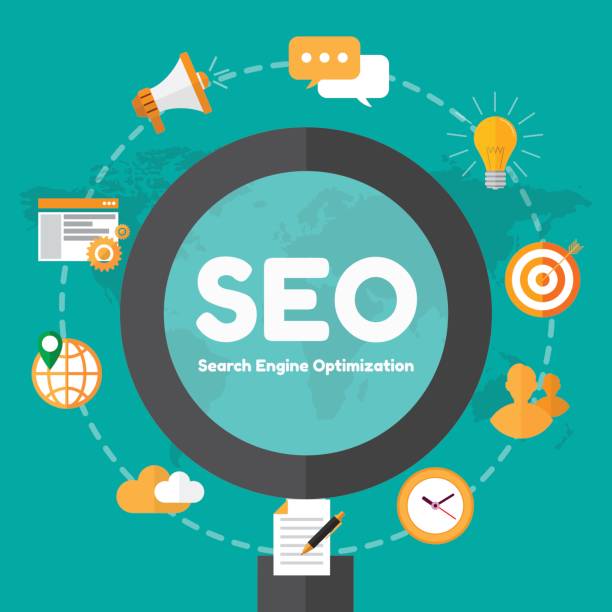What is Off-Page SEO and Why is it Important?

Off-Page SEO refers to a set of actions taken outside your website to improve its ranking in Google and other search engine results.
In fact, Off-Page SEO shows search engines that your website is credible and valuable from the perspective of other websites and internet users.
The importance of SEO off-page is that it forms a significant part of search engine ranking algorithms and can have a substantial impact on increasing your website’s organic traffic.
In other words, Off-Page SEO is your online reputation and credibility.
The more websites link to you and the more you are mentioned on social media and other platforms, the more search engines conclude that your website is a reliable source of information and will give you a better ranking.
In today’s competitive world, neglecting Off-Page SEO can lead to missing many opportunities for visibility and attracting an audience.
To better understand Off-Page SEO, various factors that play a role in it must be considered.
Among the most important of these factors are link building, content marketing, social media presence, and online reputation management.
In the rest of this guide, we will delve deeper into each of these factors and provide practical solutions to improve your website’s Off-Page SEO.
Off-Page SEO, alongside On-Page SEO and Technical SEO, forms the main pillars of a successful SEO strategy.
Therefore, to achieve desired results, you must pay special attention to all three aspects.
Is your online sales not as expected? With Rasaweb, solve the problem of low sales and poor user experience forever!
✅ Increase visitor-to-customer conversion rate
✅ Create an enjoyable user experience and increase customer trust
⚡ Act now to receive a free consultation!
Link Building; The Heart of Off-Page SEO

Link building is one of the most important and influential factors in Off-Page SEO.
Links act as “votes of confidence” from other websites to your website.
The more quality and relevant inbound links (Backlinks) your website receives, the more search engines consider your website credible and valuable, giving it a better ranking.
However, note that link quality is more important than quantity.
In other words, getting a link from reputable websites relevant to your field of activity is far more valuable than getting links from many low-quality and irrelevant websites.
For example, a link from a reputable news website like ISNA in the field of economy is much more valuable for a website active in investment than dozens of links from unreliable websites.
Link building is a long-term strategy and requires patience.
There are various methods for building quality backlinks.
These methods include establishing relationships with relevant websites and requesting links, producing valuable and engaging content that is naturally shared by other websites, participating in online interviews and events and receiving links from the host websites, and publishing guest posts on reputable blogs.
Remember that buying links from unreliable websites can harm your website’s ranking instead of improving it, and may even lead to a penalty from Google.
Producing Valuable Content; The Fuel for Off-Page SEO

Producing valuable and engaging content plays a key role in Off-Page SEO.
Quality content not only attracts visitors to your website but also increases the likelihood of it being shared on social media and linked to by other websites.
In other words, good content naturally leads to link generation and increases your website’s credibility.
Valuable content should be:
- Unique and original: Avoid copying others’ content and try to produce content that has not been published elsewhere.
- Provide accurate and up-to-date information: Before publishing content, ensure the accuracy of the information provided.
- Answer audience questions and needs: Produce content that is useful and practical for your audience.
- Optimized for search engines: Use relevant keywords in the title, description, and body of the content.
There are various types of content you can produce for Off-Page SEO.
Blog articles, infographics, videos, podcasts, and e-books are among the most popular content types.
The choice of content type depends on your field of activity and your audience’s needs.
Remember that continuous publication of quality content is the key to success in Off-Page SEO.
| Content Type | Impact on Off-Page SEO | Example |
|---|---|---|
| Blog Articles | Attracting links, increasing organic traffic, improving keyword ranking | Comprehensive Off-Page SEO Guide |
| Infographics | Receiving backlinks, increasing brand awareness, sharing on social networks | Infographic comparing SEO methods |
| Videos | Attracting audience, increasing time on site, receiving backlinks from YouTube | Off-Page SEO Educational Video |
Social Networks; A Powerful Tool for Off-Page SEO

Active and effective presence on social networks can have a significant impact on your website’s Off-Page SEO.
Although social media links do not directly affect Google rankings, they can indirectly increase your website traffic, boost brand awareness, and ultimately improve your website’s ranking.
To effectively use social networks in Off-Page SEO, you should:
- Be present on social networks relevant to your field of activity: You don’t need to be a member of all social networks.
Choose only the networks where your target audience is active. - Publish engaging and shareable content: Produce content that is attractive and useful to your audience and encourages them to share it with others.
- Interact with your audience: Respond to their comments and messages and participate in discussions.
- Use relevant hashtags: Using relevant hashtags helps your content be seen by more people.
Remember that social networks are tools for communicating with your audience and engaging with them.
Use these tools correctly to increase your website’s credibility and attract more traffic.
Sharing site links on social networks helps more users become familiar with your site, resulting in significant growth in content marketing.
Is your company’s website performing as it should for your brand? In today’s competitive world, your website is your most important online tool. Rasaweb, a specialist in professional corporate website design, helps you to:
✅ Gain customer credibility and trust
✅ Convert website visitors into customers
⚡ Get a free consultation for corporate website design!
Online Reputation Management; Protecting Off-Page SEO

Online Reputation Management (ORM) refers to a set of actions taken to control and improve your brand’s image in the online space.
A positive brand image can significantly impact your website’s Off-Page SEO.
If people have positive opinions about your brand, they are more likely to link to your website and share it on social media.
Conversely, negative reviews can severely damage your website’s Off-Page SEO.
To manage your online reputation, you should:
- Continuously search for your brand name online: This helps you become aware of negative comments and feedback and respond to them in a timely manner.
- Be present on business review and rating websites: Registering on these websites and responding to customer reviews can have a positive impact on your brand image.
- Ask your customers to share their opinions about your business: Positive customer reviews can increase your website’s credibility.
- Respond to negative comments respectfully and professionally: Try to resolve customer issues and keep them satisfied.
Online reputation management is an ongoing process that requires continuous attention and effort.
By properly managing your brand image, you can strengthen your website’s Off-Page SEO and attract more traffic.
Off-Page SEO requires constant review and analysis and should be viewed as an ongoing process.
Competitor Analysis in Off-Page SEO

Competitor analysis is one of the most important steps in an Off-Page SEO strategy.
By examining competitors’ activities, you can identify their strengths and weaknesses and use their experiences to improve your strategy.
For competitor analysis in Off-Page SEO, you should pay attention to the following:
- Competitors’ inbound links: Check which websites your competitors are getting links from.
Try to get links from these websites as well. - Competitors’ content: Review competitors’ content to see what kind of content they produce and how they optimize it.
- Competitors’ social media presence: Check which social networks competitors are active on and how they interact with their audience.
- Competitors’ online reputation: Examine comments and feedback related to competitors to see what their brand image is like online.
Various tools are available for competitor analysis in Off-Page SEO.
Ahrefs, SEMrush, and Moz are among the most popular of these tools.
By using these tools, you can gain valuable insights into competitor activities and use them to improve your Off-Page SEO strategy.
By analyzing competitors, you can design the best and most effective SEO strategy for your business.
Measuring and Evaluating Off-Page SEO Results

Measuring and evaluating results is a crucial part of any SEO strategy, including Off-Page SEO.
Without measuring and evaluating results, you cannot determine if your strategy is effective or what changes need to be made.
To measure and evaluate Off-Page SEO results, you should pay attention to the following:
- Website organic traffic: An increase in website organic traffic indicates the success of your Off-Page SEO strategy.
- Keyword ranking: Improvement in the ranking of keywords relevant to your business indicates that your Off-Page SEO strategy is working correctly.
- Number of inbound links: An increase in the number of quality inbound links to your website indicates that your website’s credibility is increasing.
- Social media engagement rate: An increase in social media engagement rate (likes, comments, shares) indicates that your content is appealing to your audience.
Various tools are available for measuring and evaluating Off-Page SEO results.
Google Analytics, Google Search Console, and Ahrefs are among the most popular of these tools.
By using these tools, you can gain valuable insights into the performance of your Off-Page SEO strategy and use them to improve it.
Monthly or quarterly evaluation and review of your Off-Page SEO performance help you correct errors and continue your path with strength. Off-Page SEO helps you improve your branding on Google.
| Indicator | Measurement Method | Suggested Tool |
|---|---|---|
| Organic Traffic | Checking traffic from search engines | Google Analytics |
| Keyword Ranking | Checking keyword positions in search results | SEMrush, Ahrefs |
| Number of Backlinks | Counting incoming links to the site | Google Search Console, Ahrefs |
| Social Engagement Rate | Measuring likes, comments, and content shares on social media | Social Media Analytics Tools |
Essential Tools for Off-Page SEO

To successfully implement an Off-Page SEO strategy, you need various tools to help you manage, analyze, and optimize your activities.
Some essential tools for Off-Page SEO include:
- Ahrefs: A powerful tool for analyzing inbound links, examining competitors, and finding link-building opportunities
- SEMrush: A comprehensive tool for keyword research, competitor analysis, and website rank tracking
- Moz Pro: A tool for SEO analysis, rank tracking, and inbound link checking
- Google Analytics: A free tool for analyzing website traffic and user behavior
- Google Search Console: A free tool for monitoring website performance in search results and receiving alerts
In addition to these tools, other tools can also help you with Off-Page SEO.
BuzzSumo for finding popular content, Mention for monitoring brand mentions online, and Hunter.io for finding contact information for individuals on various websites are among these tools.
Choosing the right tool depends on your needs and budget.
Before purchasing any tool, try its trial version to ensure it is suitable for you.
Correct use of these tools greatly aids in search engine optimization.
Are you missing business opportunities because of an outdated website? With Rasaweb, permanently solve the problem of not attracting potential customers through your website!
✅ Attract more qualified leads
✅ Increase brand credibility in the eyes of customers
⚡ Get a free corporate website design consultation!
Common Mistakes in Off-Page SEO to Avoid

In Off-Page SEO, as with On-Page SEO, there are mistakes that can harm your website’s ranking.
Some common mistakes in Off-Page SEO include:
- Buying links from unreliable websites: Buying links can harm your website’s ranking instead of improving it, and may even lead to a penalty from Google.
- Using black-hat SEO techniques: Using black-hat SEO techniques (such as hidden text and links, keyword stuffing, and creating doorway pages) can lead to penalties from Google.
- Ignoring link quality: Link quality is more important than quantity.
Getting links from reputable and relevant websites in your field of activity is far more valuable than getting links from many low-quality and irrelevant websites. - Neglecting social networks: An active and effective presence on social networks can significantly impact your website’s Off-Page SEO.
- Not managing online reputation: Negative reviews can severely damage your website’s Off-Page SEO.
Properly managing your brand image online is essential.
By avoiding these common mistakes, you can prevent damage to your website’s ranking and implement an effective Off-Page SEO strategy.
Off-Page SEO is a long-term investment and should not be rushed or ruined by mistakes.
The Future of Off-Page SEO; What Changes Await Us?

The world of SEO is constantly changing and evolving.
Google’s algorithms are continuously updated, and SEO techniques that are effective today may not be effective tomorrow.
To succeed in Off-Page SEO, you must always be aware of the latest changes and developments and adjust your strategy accordingly.
Some of the most important future trends in Off-Page SEO include:
- Increased importance of user experience: Google increasingly values user experience (UX).
Websites that provide a good user experience will achieve better rankings in search results. - Greater impact of artificial intelligence: Artificial Intelligence (AI) is changing how search engines operate.
Websites that use AI for content creation and SEO optimization will have a competitive advantage. - Increased importance of video content: Video content is becoming increasingly popular.
Websites that produce quality video content will attract more traffic. - Greater impact of mobile SEO: With the increased use of mobile phones, mobile SEO is becoming more important.
Websites optimized for mobile devices will achieve better rankings in search results.
Given these changes, to succeed in Off-Page SEO, you must pay special attention to user experience, artificial intelligence, video content, and mobile SEO.
Off-Page SEO is a dynamic process that requires continuous learning and adaptation. Off-Page SEO must evolve in line with the latest Google changes.
Frequently Asked Questions
| Row | Question | Answer |
|---|---|---|
| 1 | What is Off-Page SEO? | Off-Page SEO refers to a set of actions taken outside your website to improve its ranking in search engines. These actions include backlink building, social media presence, branding, and more. |
| 2 | Why is Off-Page SEO so important? | Off-Page SEO shows search engines that your website is credible, popular, and trustworthy. Quality backlinks from reputable sites are strong signals for better ranking and help increase your domain authority. |
| 3 | What are the most important components of Off-Page SEO? | The most important components of Off-Page SEO include: Link Building, Content Marketing, Social Media Marketing, Influencer Marketing, and Online Reputation Management. |
| 4 | What is a backlink and why is it important for Off-Page SEO? | A backlink is a link that points from another website to your website. These links act as “votes of confidence” in Google’s eyes and indicate the credibility of your content. The more numerous and higher quality the backlinks, the better your site’s ranking will be. |
| 5 | What are the types of backlinks in terms of SEO impact? | The two main types of backlinks include DoFollow and NoFollow. DoFollow backlinks pass authority (Link Juice) and directly impact ranking. NoFollows do not pass authority but can still generate traffic and help make the link profile appear natural. (Also UGC and Sponsored) |
| 6 | How can one create quality backlinks for their site? | To build quality backlinks, one can use methods such as: producing excellent and shareable content, guest posting on relevant and reputable sites, broken link building, Digital PR, and analyzing competitor backlinks. |
| 7 | What are toxic backlinks and how do they affect a site? | Toxic or spam backlinks are links that point to your site from low-quality, spammy, or irrelevant websites. These backlinks can harm your site’s ranking and even lead to penalties by Google’s algorithms. |
| 8 | What is the role of social networks in Off-Page SEO? | Although social signals (likes, shares, etc.) are not direct ranking factors, they do help Off-Page SEO. They increase content visibility, drive direct traffic to the site, and ultimately increase the chance of acquiring natural backlinks and improving brand recognition. |
| 9 | What is the importance of diversity in a backlink profile? | Diversity in a backlink profile means that your links come from various sources (blogs, forums, news sites, directories), with diverse anchor texts, and a mix of DoFollow and NoFollow links. This diversity shows Google that your link-building is natural and organic. |
| 10 | What are common mistakes in Off-Page SEO that should be avoided? | Common mistakes include: buying backlinks in large volumes from low-quality sources, over-optimization with target keywords in link building, neglecting quality in favor of quantity in backlink building, lack of diversity in the link profile, and ignoring toxic backlinks and not disavowing them. |
And other services of Rasaweb Advertising Agency in the field of advertising
Smart Sales Automation: A combination of creativity and technology for campaign management through custom programming.
Smart Link Building: An innovative platform to improve customer behavior analysis with precise audience targeting.
Smart Social Media: An effective tool for online growth with precise audience targeting.
Smart Conversion Rate Optimization: An innovative platform to improve click-through rate increase with custom programming.
Smart SEO: A new service for increasing online growth through optimizing key pages.
And over hundreds of other services in the field of internet advertising, advertising consultation, and organizational solutions
Internet Advertising | Advertising Strategy | Advertorials
Sources
What is Off-Page SEO?
What is Off-Page SEO? A Complete Guide
Complete Guide to Off-Page SEO
What is Off-Page SEO? (+7 Off-page SEO Techniques)
? Are you looking for a big leap in your online business? Rasaweb Afarin, by providing comprehensive digital marketing services including fast and professional website design, SEO, and social media management, paves your way to success. With us, experience a powerful and influential presence in the digital world.
📍 Tehran, Mirdamad Street, next to Bank Markazi, Kazerun Jonubi Alley, Ramin Alley, No. 6



